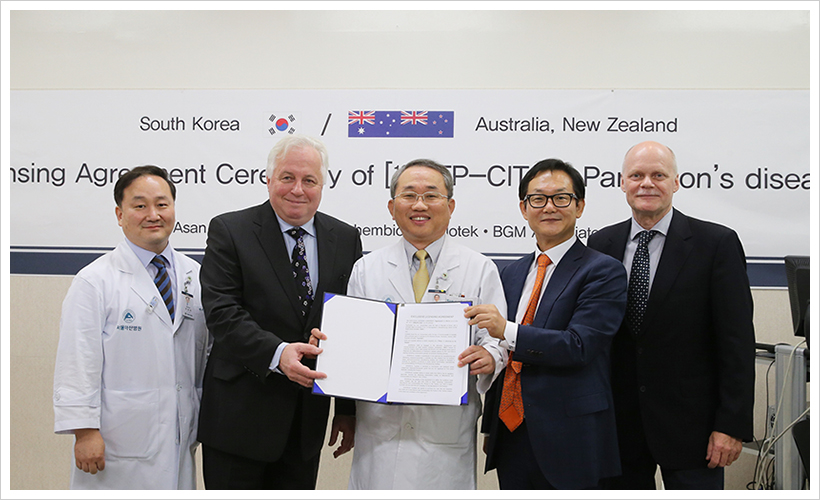RELATED Live
 A new diagnostic drug, FP-CIT, for Parkinson's disease that was developed by Professor Jae Seung Kim, Chair of the Department of Nuclear Medicine in Asan Medical Center, was exported overseas for the first time. FP-CIT is a radiopharmaceutical that is injected when positron emission tomography (PET) is performed and diagnoses Parkinson's disease by measuring the distribution and density of the dopamine transporter in the human brain. Patients with Parkinson's disease produce less dopamine, a neurotransmitter in a person’s brain, than normal people. FP-CIT has strong binding force with dopamine so that it is effective in differentiating Parkinson's disease from PET. Duchembio in Korea and BGM Associates GmbH, Germany have formed a consortium and have concluded partnerships regarding a patent license for overseas use in June last year. With the first fruits of the contract, they have entered into an Australian and New Zealand medical market with a contract of $10 billion in technology exports to Cycloteck in Australia. Currently, the Department of Nuclear Medicine at Asan Medical Center is developing various kinds of radiopharmaceuticals for an early diagnosis of diseases which are difficult to diagnose with existing diagnostic technology, such as Parkinson's disease, dementia, cancer, vascular disease, and so on.
A new diagnostic drug, FP-CIT, for Parkinson's disease that was developed by Professor Jae Seung Kim, Chair of the Department of Nuclear Medicine in Asan Medical Center, was exported overseas for the first time. FP-CIT is a radiopharmaceutical that is injected when positron emission tomography (PET) is performed and diagnoses Parkinson's disease by measuring the distribution and density of the dopamine transporter in the human brain. Patients with Parkinson's disease produce less dopamine, a neurotransmitter in a person’s brain, than normal people. FP-CIT has strong binding force with dopamine so that it is effective in differentiating Parkinson's disease from PET. Duchembio in Korea and BGM Associates GmbH, Germany have formed a consortium and have concluded partnerships regarding a patent license for overseas use in June last year. With the first fruits of the contract, they have entered into an Australian and New Zealand medical market with a contract of $10 billion in technology exports to Cycloteck in Australia. Currently, the Department of Nuclear Medicine at Asan Medical Center is developing various kinds of radiopharmaceuticals for an early diagnosis of diseases which are difficult to diagnose with existing diagnostic technology, such as Parkinson's disease, dementia, cancer, vascular disease, and so on.
RELATED Live
RELATED Doctor
RELATED Members
Inquiry